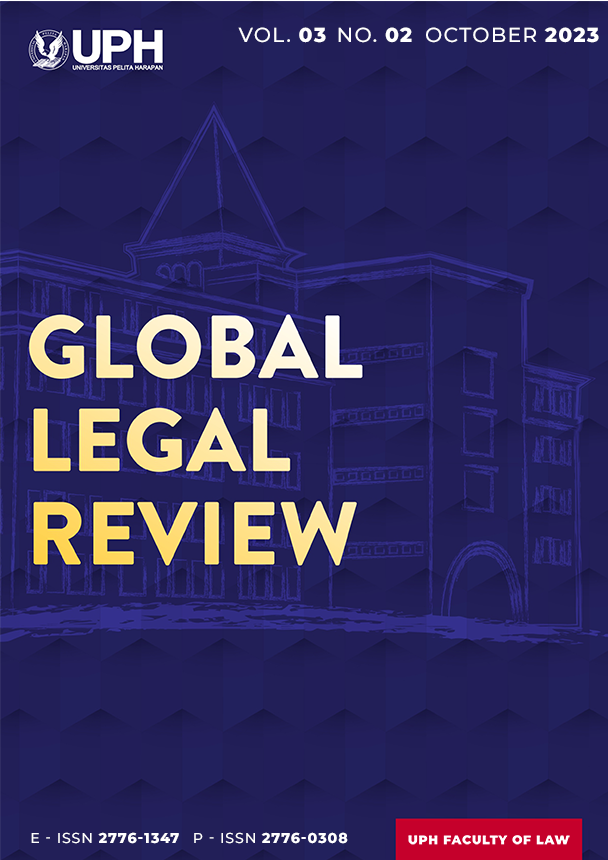Implications of the Implementation of the Tax Administrative Sanctions Policy on Taxpayer Compliance
DOI:
https://doi.org/10.19166/glr.v3i2.6724Keywords:
tax administration sanctions, tax compliance, legal substance, legal structure, legal cultureAbstract
General provisions on taxation in Indonesia have regulated tax administration sanctions. The regulation and application of tax administration sanctions is expected to encourage taxpayer compliance. Through taxpayer compliance, tax revenue can reach the target on an ongoing basis. However, in reality, tax revenues in Indonesia tend to never reach the target. This is due to the still weak taxpayer compliance. Departing from this situation, this study examines the regulation of tax administration sanctions and their effectiveness in increasing taxpayer compliance. This research is a juridical-normative research. Data was collected through a study of documents originating from legal materials, both primary, secondary and tertiary. The research finding is that changes to the provisions on tax administration sanctions based on Law Number 7 of 2021 concerning Harmonization of Tax Regulations can encourage taxpayer compliance because these changes are marked by a reduction in sanctions that are not burdensome to taxpayers and are better able to reflect proportionality, convenience, and fairness compared to provisions previously. However, the application of tax administration sanctions in encouraging tax compliance still faces obstacles, namely that there is no adequate infrastructure in supervising and examining all taxpayers who commit tax non-compliance, the quantity and quality of tax officials in supervising and examining taxpayers, and the attitude of taxpayers who commit tax avoidance rather than fulfilling tax obligations.
References
Aryati, T. “Analisis Faktor-Faktor yang Mempengaruhi Tingkat Kepatuhan WP Badan.” Jurnal Media Ekonomi dan Manajemen 25, no. 1 (2021): 13–29.
Friedman, Lawrence. Sistem Hukum Perspektif Ilmu Sosial. Bandung: Nusa Media, 2017.
Hernando, Redo Alpha, and Dian Wahyudin. “Modernisasi Administraasi Perpajakan Dalam Rangka Optimalisasi Pelayanan Pajak Berbasis Digital.” Jurnal Pajak Vokasi (JUPASI) 1, no. 2 (March 2020): 119–125. https://doi.org/10.31334/jupasi.v1i2.819.
Mahdi, and Windi Ardiati. “Pengaruh Kesadaran WP dan Sanksi Pajak Terhadap Kepatuhan WP Orang Pribadi Pada Kantor Pelayanan Pajak Pratama Banda Aceh.” Jurnal Ekonomi Manajemen dan Akuntansi 3, no. 1 (2017). https://doi.org/10.26905/ap.v3i1.1324.
Marzuki, Peter Mahmud. Penelitian Hukum. Jakarta: Kencana Prenada, 2010.
Miles, Matthew B. Analisis Data Kualitatif: Buku Sumber Tentang Metode-Metode Baru. Jakarta: Universitas Indonesia, 1992.
Nasucha, Chaizi. “Pengaruh Reformasi Administrasi Perpajakan Terhadap Kepatuhan Wajib Pajak.” PhD diss., Universitas Padjadjaran, Bandung, 2003.
Pratama, Wibi Pangestu, and Novita Sari Simamora. “Chatib Basri: Penerimaan Pajak Tembus Target Karena Kenaikan Harga Komoditas.” Bisnis.com, December 28, 2021. https://ekonomi.bisnis.com/read/20211228/259/1482707/chatib-basri-penerimaan-pajak-tembus-target-karena-kenaikan-harga-komoditas.
Resmi, Siti. Perpajakan Teori dan Kasus. Jakarta: Salemba Empat, 2014.
Sinaga, Niru Anita. “Pemungutan Pajak dan Permasalahannya di Indonesia.” Jurnal Ilmiah Hukum Dirgantara 7, no. 1 (September 2016): 142–157. https://journal.universitassuryadarma.ac.id/index.php/jihd/article/view/128.
Soekanto, Soerjono, and Sri Mamudji. Penelitian Hukum Normatif: Suatu Tinjauan Singkat. Jakarta: PT Raja Grafindo Persada, 2003.
Syukro, Ridho. “Jumlah Ideal Pegawai Pajak Di Indonesia Sekitar 60.000 Orang.” Beritasatu.com, October 11, 2013. https://www.beritasatu.com/ekonomi/143854/jumlah-ideal-pegawai-pajak-di-indonesia-sekitar-60000-orang.
Verboon, Peter, and Marius van Dijke. “When do severe sanctions enhance compliance? The role of prosedural fairness.” Journal of Economic Psychology 32, no. 1 (February 2011): 120–130. https://doi.org/10.1016/j.joep.2010.09.007.
Webley, Paul. “Tax Compliance by Businesses.” In New Perspectives on Economic Crime, edited by Hans Sjögren and Göran Skogh. Cheltenham: Edward Elgar, 2004. https://doi.org/10.4337/9781843769835.00012.
Yudkin, Leon. The Legal Structure of Effective Income Tax Administration. Cambridge: Harvard Law School, 1973.
Downloads
Published
How to Cite
Issue
Section
License
Copyright (c) 2023 Haris Pandi Wijaya

This work is licensed under a Creative Commons Attribution-ShareAlike 4.0 International License.
Authors who publish with this journal agree to the following terms:
1) Authors retain copyright and grant the journal right of first publication with the work simultaneously licensed under a Creative Commons Attribution License (CC-BY-SA 4.0) that allows others to share the work with an acknowledgement of the work's authorship and initial publication in this journal.
2) Authors are able to enter into separate, additional contractual arrangements for the non-exclusive distribution of the journal's published version of the work (e.g., post it to an institutional repository or publish it in a book), with an acknowledgement of its initial publication in this journal.
3) Authors are permitted and encouraged to post their work online (e.g., in institutional repositories or on their website). The final published PDF should be used and bibliographic details that credit the publication in this journal should be included.

